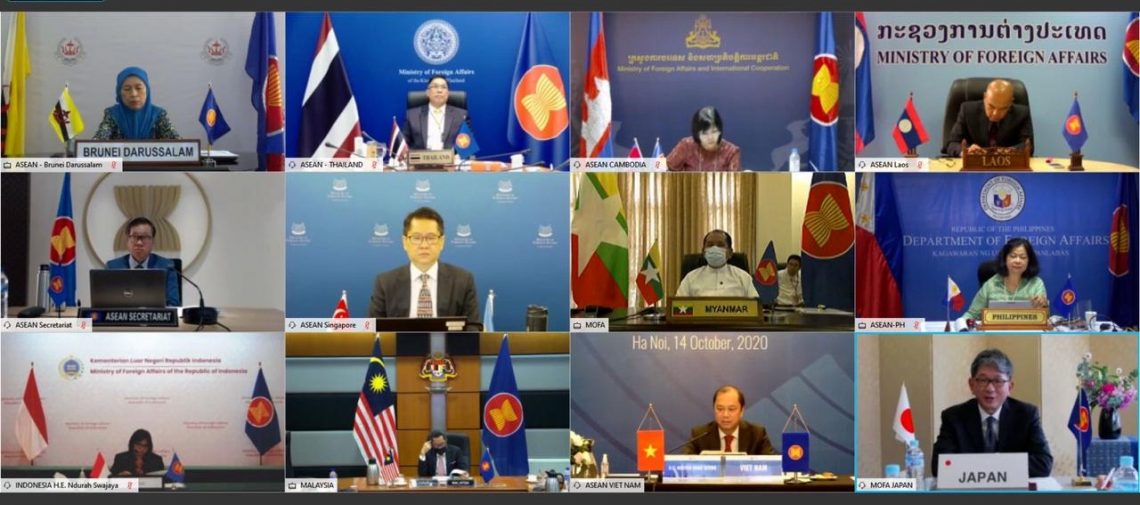JAKARTA, 14 October 2020 – Today, Senior Officials of ASEAN and Japan reaffirmed their commitment to further strengthen relations and advance mutually beneficial cooperation at the 35th ASEAN Japan-Forum.
The virtual meeting noted the good progress made in ASEAN-Japan cooperation over the past year, including through the implementation of the current Implementation Plan to promote cooperation across a wide range of areas.
The Meeting highlighted the close cooperation between ASEAN and Japan in response to the COVID-19 pandemic. ASEAN appreciated Japan’s support towards the establishment of the ASEAN Centre for Public Health Emergencies and Emerging Diseases Centre and contribution to the COVID-19 ASEAN Response Fund, as well as Japan’s support for other initiatives of ASEAN.
Both sides agreed to enhance cooperation in the post-pandemic recovery, particularly in mitigating the economic impact of COVID-19.
The meeting stressed the commitment to maintain regional trade and investment, to ensure regional supply chain including through the implementation of the ASEAN-Japan Economic Resilience Action Plan, and work towards signing the Regional Comprehensive Economic Partnership agreement this year.
Further, both sides agreed to strengthen cooperation in other areas such as digital technology, MSMEs development, climate change, disaster management, connectivity, and smart city.
ASEAN welcomed Japan’s support for the ASEAN Outlook on Indo-Pacific (AOIP), and Japan’s commitment to promote practical cooperation with ASEAN in the areas outlined in the AOIP.
At the meeting, both sides exchanged views on regional issues of common interest and concern. The Senior Officials reaffirmed the importance of maintaining and promoting peace, security, stability, and freedom of navigation in and overflight above the South China Sea. They also stressed the importance of continued peaceful dialogue and implementation of relevant United Nations Security Council Resolutions towards achieving lasting peace in a denuclearised Korean Peninsula.
- ABOUT ASEANThe Association of Southeast Asian Nations, or ASEAN, was established on 8 August 1967 in Bangkok, Thailand, with the signing of the ASEAN Declaration (Bangkok Declaration) by the Founding Fathers of ASEAN: Indonesia, Malaysia, Philippines, Singapore and Thailand. Brunei Darussalam joined ASEAN on 7 January 1984, followed by Viet Nam on 28 July 1995, Lao PDR and Myanmar on 23 July 1997, and Cambodia on 30 April 1999, making up what is today the ten Member States of ASEAN.Menu
- WHAT WE DO
ASEAN organs always strive to achieve ASEAN’s goals and objectives, the Secretary-General of ASEAN and the ASEAN Secretariat shall be functioned as coordinating Secretariat to help facilitate effective decision-making withing and amongst ASEAN bodies. In addition, each Member State shall appoint a Permanent Representative to liaise with Secretary-General of ASEAN and the ASEAN Secretariat
Menu - WHO WE WORK WITH
ASEAN shall develop friendly relations and mutually beneficial dialogues, cooperation and partnerships with countries and sub-regional, regional and international organisations and institutions. This includes external partners, ASEAN entities, human rights bodies, non-ASEAN Member States Ambassadors to ASEAN, ASEAN committees in third countries and international organisations, as well as international / regional organisations.
Menu - OUR COMMUNITIES
The rodmap for an ASEAN Community (2009-2015) was declared by the leaders in 2009. The ASEAN Community, anchored on three community pillars: Political-Security Community, Economic Community, Socio-Cultural Community was launched in 2015. The ASEAN 2025: Forging Ahead Together was introduced in 2015 as a Post-2015 Vision. It comprises the ASEAN Community Vision 2025, the ASEAN Political-Security Community Blueprint 2025, the ASEAN Economic Community Blueprint 2025 and the ASEAN Socio-Cultural Community Blueprint 2025
Menu - SITEMAP





